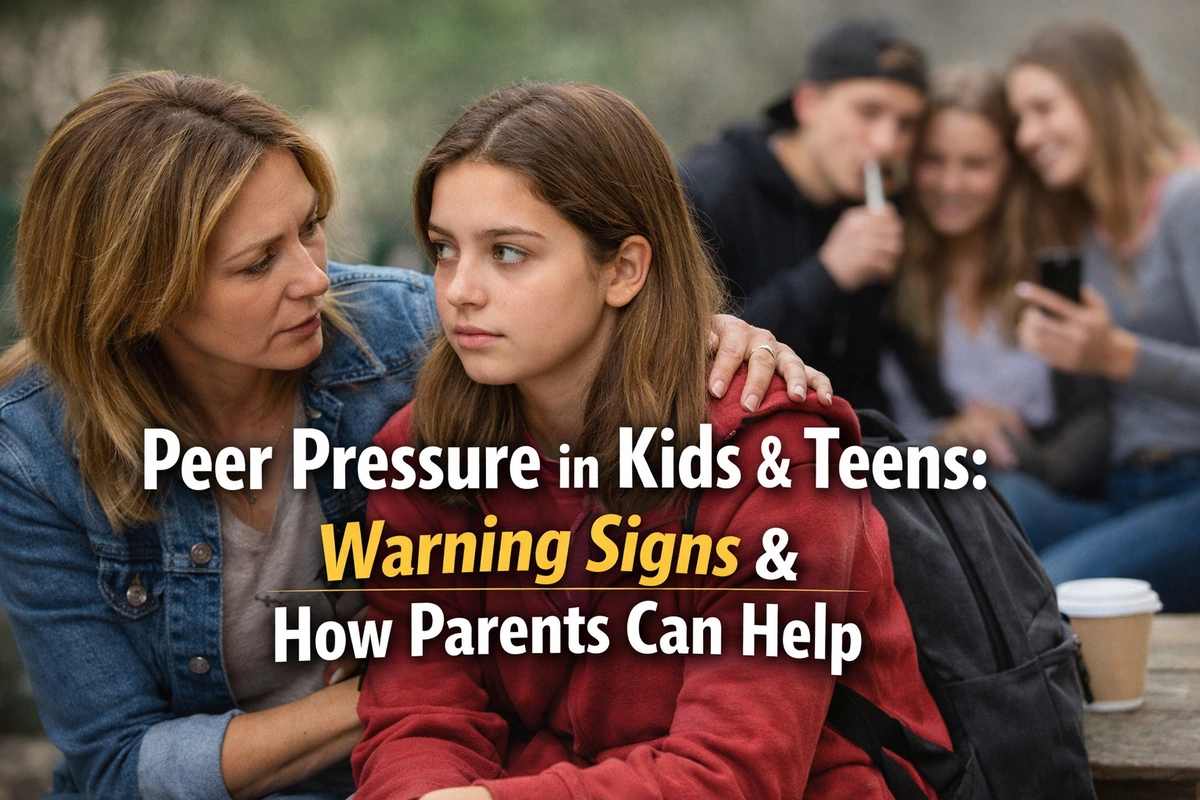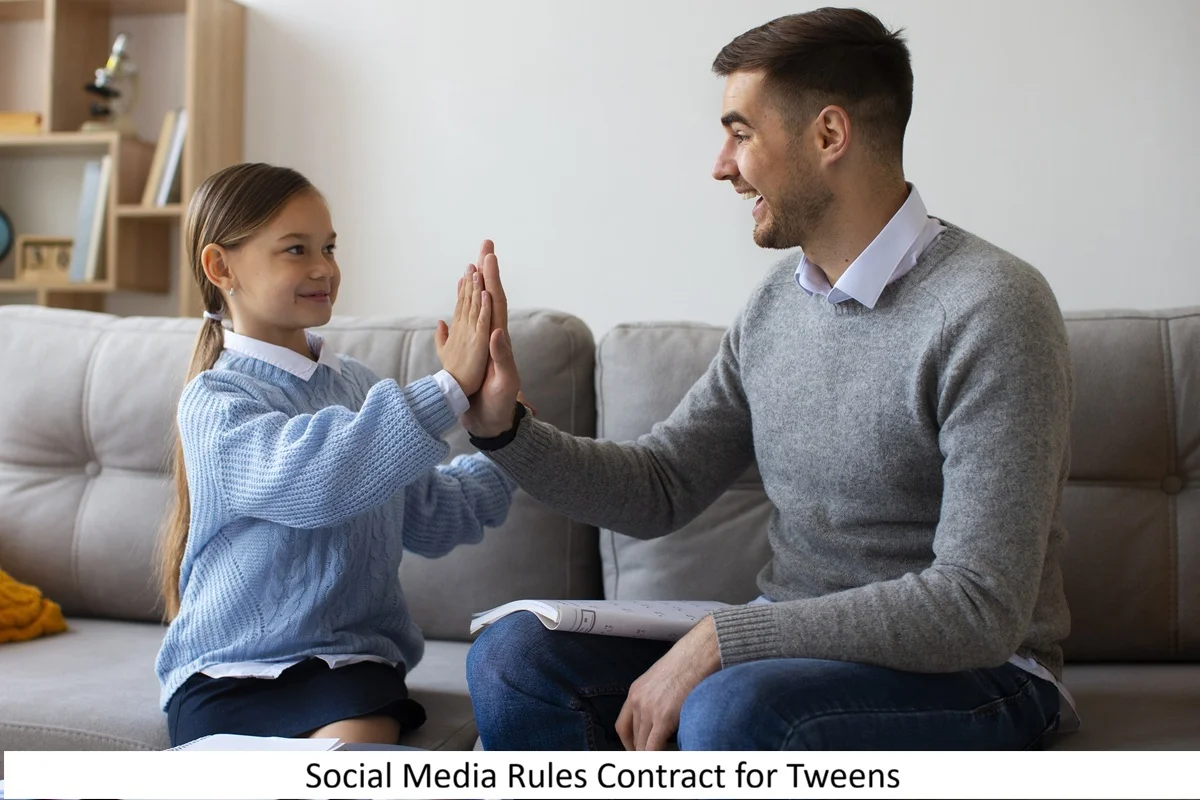Peer pressure is the influence from friends or a group that pushes a child to change behavior to fit in. Sometimes it’s positive (friends encourage good habits). But unhealthy peer pressure in kids and teens can lead to risky choices, secrecy, and stress. This guide explains the warning signs, real-life examples, and calm steps parents can take without panic or constant fighting. You may also like Peer Pressure vs Parental Influence: Which Shapes Your Child’s Future?
Quick takeaways
- Watch for patterns over 2–4 weeks, not one bad day.
- The biggest protection is connection + supervision + routines.
- Teach your child an “exit plan” so they can leave risky situations safely.
Peer Pressure in Kids and Teens: What It Looks Like by Age
Kids (6–10) often copy friends to belong: “Everyone has it,” “They’ll laugh if I don’t.” Pressure can show up as teasing, excluding someone, or joining small rule-breaking.
Preteens (10–12) care more about status. They may change their style, stop certain hobbies, or hide small things to match a group.
Teens (13–18) face higher-stakes pressure: vaping, alcohol, skipping classes, risky online behavior, relationships, and “dares.” Pressure may be direct (“Do it or you’re weak”) or indirect (everyone else is doing it).
Top 7 Warning Signs of Unhealthy Peer Pressure
If you’re searching for signs of peer pressure in kids or signs of peer pressure in teens, start here. Look for several signs happening together.
- Sudden secrecy (hiding chats, deleting messages, panic if you touch the phone)
- New friends your child won’t introduce or talk about
- Mood shifts after hangouts (anger, anxiety, shame)
- School changes (skipping, falling grades, new complaints)
- Unexplained items or cash, or missing money at home
- Dropping hobbies they used to enjoy
- Big changes in sleep, confidence, or behavior (“I’m boring,” “They’ll leave me”)
Parent rule: If 3–4 signs continue for 2–4 weeks, it’s time to step in calmly.
Peer Pressure at School: Common Situations
Peer pressure at school often looks “small,” but it can shape habits fast.
- Copying homework or cheating “just this once”
- Joining in when someone is bullied to avoid being targeted
- Skipping class with a group
- Acting tough to gain respect
- Pressured spending (snacks, gadgets, branded items)
What helps: talk about school pressure like a life skill, not a moral lecture.
Peer Pressure Online: What to Watch For
Online pressure can be intense because it’s public and fast.
- Group chats that demand instant replies
- Dares and “challenge” behavior
- Image-based pressure (posting, sending photos, body comparison)
- Public humiliation, screenshots, “expose” pages
- Being pushed to like, comment, or attack someone
Red flag: your child seems afraid of the phone, not just attached to it.
Real-Life Examples (So You Can Spot It Early)
Example 1: Vaping pressure
A teen is told, “Try it everyone does. Don’t be a baby.” They agree because refusal risks embarrassment.
Example 2: Cheating pressure
A friend says, “Send me your answers or I won’t help you later.” Your child feels forced to keep the friendship.
Example 3: Bullying pressure
Kids laugh at someone, and your child joins in to avoid becoming the next target.
Example 4: Online dare
A group chat pushes risky behavior and threatens, “If you don’t do it, we’ll post about you.”
These are common patterns: fear of rejection, status, and public embarrassment.
The Biggest Parenting Mistakes (and Better Alternatives)
Mistake 1: Attacking the friends
Calling friends “bad” usually makes your child defend them and hide more.
Do instead: Focus on behavior.
“Some choices around that group look risky. I care about your safety.”
Mistake 2: Lecturing when emotions are high
Advice feels like control when your child is already stressed.
Do instead: Connect first.
“I’m not here to shame you. I’m here to help you handle this.”
Mistake 3: No clear boundaries
Kids and teens feel safer when limits are predictable.
Do instead: Set a few non-negotiables (safety rules) and repeat calmly.
What to Say: Short Scripts That Work
If you’re wondering how to help a child deal with peer pressure or how to help teens handle peer pressure, these lines are a strong start.
If your child says “Everyone is doing it”
- “People exaggerate. What do you want to choose?”
- “Belonging shouldn’t cost your safety.”
If your teen is pressured to vape, drink, or skip class
- “Blame me. Say: ‘My parents will check.’ I’ll be the bad guy.”
- “Text me one word and I’ll call you with an excuse.”
If friends threaten rejection
- “Real friends don’t demand you break your values.”
- “If they leave because you said no, that’s information.”
If your child already messed up
- “Thank you for telling me.”
- “We’ll handle the consequence, but I’m on your team.”
- “Let’s plan what you’ll do next time.”
For more refusal scripts, read Peer Pressure: How to Say No Without Losing Yourself.
What Parents Can Do: A Practical Plan
1) Predictable supervision (without spying)
Know: where they’re going, who they’re with, when they’ll be back, and how to reach them. Consistency prevents “opportunity moments.”
2) The 24-hour reset (fast help)
If you’re worried right now:
- Have one calm talk (10 minutes max): “I’m here to help, not punish.”
- Set one safety boundary for this week (curfew, phone at night, supervised hangouts).
- Add one positive anchor (sport, gym, tutoring, volunteering, family routine).
3) Teach refusal skills in 30 seconds
Practice one sentence weekly:
- “No thanks. I’m good.”
- “Not my thing.”
- “I’m not risking it.”
Short practice beats long speeches.
4) Give them an exit plan
Make a family rule: they can call you anytime to leave a situation, no yelling in the car. Safety first.
5) Improve the environment
Sometimes the best fix is changing the setting:
- new club/sport
- different lunch group
- supervised hangouts at home
- study partner instead of big groups
Positive Peer Pressure (Use It on Purpose)
Peer influence can also help your child. Encourage friendships that push toward:
- studying, sports, volunteering
- kindness and respect
- goals and healthy routines
You can say: “Choose friends who make you proud afterward.” Want the healthy side too? See 7 Ways Positive Peer Pressure Can Positively Influence Teenagers (With Real Examples)
When to Get Outside Help
Get extra support if you see:
- threats, weapons talk, serious violence
- repeated substance use
- sexual coercion/exploitation
- self-harm talk or extreme isolation
- school refusal, running away, or frequent police/school discipline involvement
A school counselor, trusted therapist, or family doctor can help you assess what’s going on.
FAQ
Usually yes, because teen choices can carry bigger social and real-world consequences.
Start with conversation and boundaries. If safety is at risk, some parents take stronger steps, but trust should be protected where possible.
Calm connection + one clear safety boundary + an exit plan.
Conclusion
Peer pressure in kids and teens won’t disappear but your child can learn to handle it. When parents stay calm, build routines, teach refusal skills, and keep communication open, kids gain real strength: the ability to belong without betraying themselves.
Explore more parent guides on BestChildcareTips




